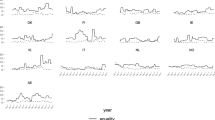Summary
This study is based on interviews with twenty-five Austrian scientists, who live and work in the U. S. and who consider themselves emigrated or nearly emigrated. — Emigration emerges as a process — rather than a one time event — which over the years is either solidified or reversed. Movement in this process depends on a series of decisions, few of whom are truly great or dramatic. Mostly, they seem minor and are concerned with immediate issues. In their totality however, they form a series of binding obligations and contracts, which tend to make emigration into a fact. — Of the motivations underlying these decisions two are of major importance: the professional identification and the attachment to one's children. Emigration thus becomes a shift in one's personal identity. The early, juvenile identity — which binds to the home country — cannot be replaced, just as old friendships cannot be repeated. It's loss is instead counterbalanced by a particular emphasis of the ‘professional’ and the ‘parental’ identity. At a later age, when both these aspects of identity have to lose in meaning, one attempts to reestablish the continuity with earlier life phases, and the tendency to remigrate increases.
Zusammenfassung
Die vorliegende Studie basiert auf Interviews mit fünfundzwanzig österreichischen Wissenschaftlern, die in den Vereinigten Staaten leben und arbeiten, und die — nach ihrem eigenen Urteil — emigriert oder nahezu emigriert sind. — In der Untersuchung wurde deutlich, daß man Emigration nicht als ein einmaliges Ereignis sehen soll, sondern als einen Prozeß, der mit der Abwanderung beginnt und über die Jahre solidifiziert oder rückgängig gemacht wird. Seine Richtung und sein Verlauf hängen von einer Reihe von Entscheidungen ab, die meist weder großartig noch dramatisch sind, sondern das tägliche Leben oder die nahe Zukunft betreffen, die aber in ihrer Gesamtheit zu bindenden Verpflichtungen und Kontrakten führen und die Emigration mehr und mehr zu einer Tatsache werden lassen. — Unter den Motivationen, die diesen Entscheidungen zugrundeliegen, sind zwei wesentlich: die berufliche Identifikation und die Bindung an die eigenen Kinder. Damit beruht Emigration auf einer Verschiebung in der persönlichen Identität. Die frühe, jugendliche Identität, die an die Heimat bindet, kann nicht ersetzt werden — so wie die alten Freundschaften nicht wiederholt werden können. Ihr Verlust wird aufgewogen durch eine besondere Betonung der ‘beruflichen’ und ‘elterlichen’ Identität. Im späteren Alter — wenn diese beiden Aspekte an Bedeutung verlieren müssen — versucht man die Kontinuität mit früheren Lebensphasen wiederherzustellen, das Bedürfnis in die Heimat zurückzukehren wird wieder stärker.
Similar content being viewed by others
Literatur
Schmiedeck, R. A.: Motive zur Ab- und Rückwanderung bei österreichischen Wissenschaftlern und Akademikern. Kölner Z. für Soziologie und Sozialpsychologie. 25, 594–605 (1973)
Schlag, W.: A survey of Austrian emigration to the U. S. In: Österreich und die Angelsächsische Welt. Hietsch, O. (ed.) S. 139–196. Wien — Stuttgart: Wilhelm Braumueller 1961
Nowotny, H., Knorr, K.: Erster Zwischenbericht zur Abwanderungsstudie “Untersuchung des Ausmaßes und der Ursachen der Abwanderung qualifizierten wissenschaftlich- technischen Personals ins Ausland (Mimeograph) Wien: Institut für höhere Studien, 1971
Imhof, E. P.: Der Brain-Drain hat kehrtgemacht. Arbeit und Wissenschaft, 26, 44–45 (1972)
U.S. Dept. of Justice, Immigration and Naturalization Service: Table: Immigrants whose country of last permanent residence was Austria, admitted as professional, technical or kindred workers, January – June 1952 and the years ended June 30, 1953–1972. Washington, D. C., 1973
Myers, R. G.: ‘Brain drains’ and ‘Brain gains’: Comments on the state of research. Int. Developm. Rev. 9, 4–9 (1967)
Oteiza, E.: A differential push-pull approach In: The Brain Drain. Adams, W. (ed.) p. 120–134. New York: Macmillan 1968
Wilder-Spaulding, E.: The quiet invaders — the story of the Austrian impact upon America. Wien: Österreichischer Bundesverlag für Unterricht, Wissenschaft und Kunst. 1968
Wilson, J. A.: The immigration of British scientists. Minerva 5, 20–29 (1966/67)
Illsely, R.: Diskussion In: Population Growth and the Brain Drain. Beckhofer, F. (ed.) p. 57–61. Edinburgh: Univ. Press Edinburgh 1969
Bejer, G.: Brain drain as a burden, a stir ulus and a challenge to European integration ibid p. 8–20.
Revel, J. -F.: Without Marx or Jesus — the new American revolution has begun. p. 26–31. Garden City, N. Y.: Doubleday & Co. 1971
Hoffmann-Nowotny, H. J.: Migration, ein Beitrag zu einer soziologischen Erklärung. Stuttgart: Ferd. Encke 1970
Eisenstadt, S. N.: The Absorption of Immigrants Glencoe, Ill.: Free Press 1955 (zitiert nach Hoffmann-Nowotny, S. 2)
Saunders, H.W.: Human migration and social equilibrium In: Population theory and policy. Duncan, O. D. (ed.) p. 219–229. Glencoe, Ill: Free Press 1956
Beshers, J. M.: Population processes in social systems. New York: Free Press 1967
Grotjahn, M.: On the Americanization of Martin Grotjahn. In: The home of the learned man — A Symposium on the immigrant scholar in America. Kosa, J. (ed.) p. 51–58. New Haven, Conn.: College & Univ. Press 1968
Erickson, E.: Identity and the life cycle. In: Psychological Issues. Klein, G. S. (ed.) p. 1–171. New York: Int. Univ. Press 1959
Author information
Authors and Affiliations
Additional information
Diese Arbeit wurde unterstützt durch das Bundesministerium für Wissenschaft und Forschung.
Rights and permissions
About this article
Cite this article
Schmiedeck, R.A. Österreichische Wissenschaftler in den Vereinigten Staaten. Soc Psychiatry 10, 15–24 (1975). https://doi.org/10.1007/BF00579860
Issue Date:
DOI: https://doi.org/10.1007/BF00579860




